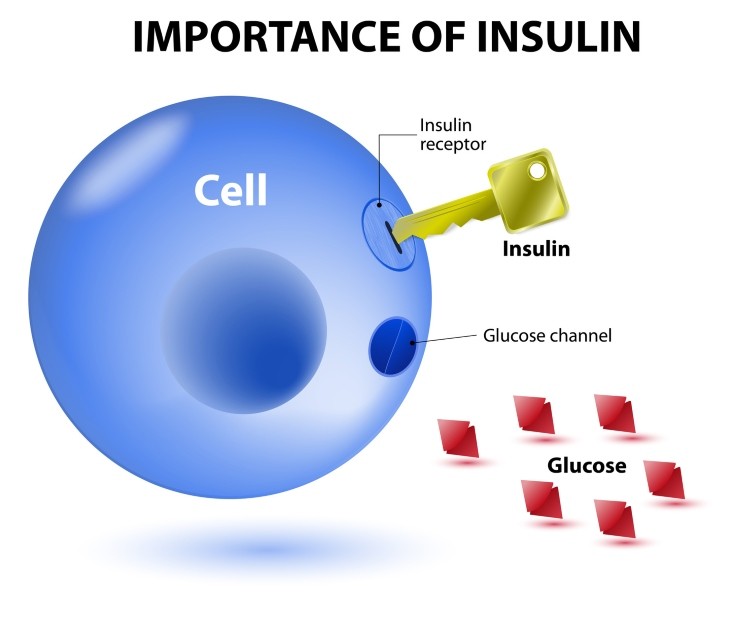Though the media and most health professionals promote the message that high sugar consumption is the cause of type 2 diabetes, this idea is not really true. Type 2 diabetes is a chronic disease in which the body cells become resistant to insulin, resulting in a rise in blood sugar. High blood sugar is a symptom of diabetes, not the cause of the disease. So what then is the actual cause of type 2 diabetes?
Every time a person eats, his or her blood sugar level rises. An increase in the concentrations of blood glucose stimulates the pancreas to secrete insulin, the hormone responsible for transporting sugar from the bloodstream into the cells. Without insulin, glucose cannot get into the liver, muscle, and fat cells. Insulin signals fat, liver, and muscle cells to absorb glucose from the blood by opening the 'glucose gates' on the cells. Insulin works by binding to insulin receptors located on the surface of these cells and triggering a series of enzymes that activate a set of glucose transporter proteins (GLUT4) which convey glucose from the bloodstream into muscle, liver, and fat cells. Once glucose is transported into the cells, plasma concentrations of glucose return to normal within hours.
What if the insulin signaling process is disrupted and cells can no longer respond to insulin? Disruption of the insulin signaling process will result in a condition called insulin resistance. Insulin resistance is a condition where the pancreas secretes insulin, but muscle cells do not respond to the insulin by taking in the glucose. Since the glucose obtained from Insulin Resistance creating diets cannot get into the cells, and they have no where else to go, the glucose will remain in the bloodstream, leading to an increase in blood sugar levels. This is what happens in type 2 diabetes. So what disrupts the insulin signaling process and induces insulin resistance? It is dietary fat (Yes, even if the fat is vegan) as well as animal protein.
Fatty foods increase the amounts of free fatty acids floating in the bloodstream and inside the muscle cells. Metabolism of fats in muscle cells produce toxic metabolites and free radicals that interrupt the insulin signaling process, induce insulin resistance, and inhibit the uptake of glucose. Fats can stimulate insulin resistance really quickly. In fact, insulin resistance can occur within 3 hours after the consumption of a high-fat meal.
Insulin resistance is the hallmark of type 2 diabetes. Fat—not sugar—induces insulin resistance, so fat is the real enemy in type 2 diabetes. Understanding this mystery is key to solving the current type 2 diabetes epidemic ravaging the world. A dietary approach that encourages the consumption of diets dominated by whole plant foods and devoid of all animal products and vegetable oils can help prevent, control, and even reverse type 2 diabetes.
Additional Information:
(1) Type 2 Diabetes: The Basics
(2) Pre-Diabetes and Insulin Resistance
(3) Fat is the Cause of Type 2 Diabetes
(4) Beat Type 2 Diabetes With These 3 Foods
